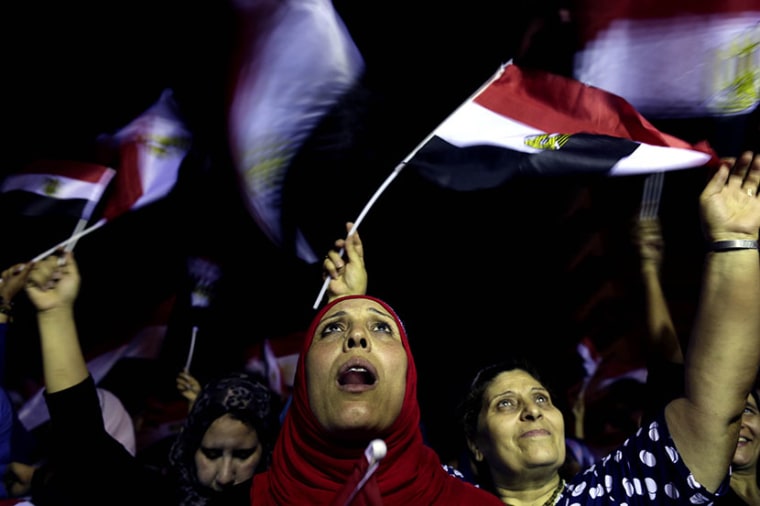Mohammed Morsi is out in Egypt. And much of the past few days unfolded on Facebook.
Egypt has undergone massive changes since the ouster of Hosni Mubarak in early 2011. And while photojournalists have largely documented this shift with photos of clamorous protesters in Tahrir Square, much of the change has been stitched together with a new social fabric: Facebook.
Using social media, Egyptians have previously organized, protested and communicated with each other and the outside world. And now the nation's leaders are getting in on the act to issue their decrees.
Essam El-Haddad, presidential assistant on foreign relations to Morsi, read the writing on the wall Tuesday when he posted on Facebook before the ouster, “As I write these lines I am fully aware that these may be the last lines I get to post on this page. For the sake of Egypt and for historical accuracy, let’s call what is happening by its real name: Military coup.”
Morsi previously tweeted that he “asserts his adherence to constitutional legitimacy and rejects any attempt to breach it,” and called for the armed forces to withdraw their ultimatum. His statement came after millions of protesters demanded he call it quits, which resulted in the army giving him 48 hours to respond to the people or it would intervene, dissolve the parliament and replace him with a civilian leadership council.
On Tuesday, Mohamed El-Beltagy, a prominent member of the Morsi-aligned Muslim Brotherhood encouraged citizens on Facebook to choose “martyrdom,” adding “We are clearly standing before an official coup by the old regime.”
And General Abdel Fattah al-Sisi wrote on the official Facebook page of the Supreme Council of the Armed Forces that the army was willing to die for its cause, saying “We swear to God that we will sacrifice even our blood for Egypt and its people, to defend them against any terrorist, radical or fool.”
Steven A. Cook, a senior fellow for Middle Eastern Studies at the Council of Foreign Relations said "authorities began to see [Facebook] as a tool to advance their own agenda after Mubarak was brought down," adding, “They recognized quite frugally that users were opinion leaders and could mobilize people through social media. They wanted to emulate that strategy.”
Social media expert Shel Holtz echoed that sentiment, arguing that Facebook became “the rallying place. People became very accustomed to it.” And it’s a way for the leaders themselves to avoid “any kind of spin that a government controlled media outlet may want to put on it.”
According to a study by Northwestern University on social networking, of those who use social media in eight Arab countries, including Egypt, 94% are on Facebook. Meanwhile, only one in four of those surveyed in Egypt Lebanon and Tunisia believed their news media in their country were credible.
Charles Hirschkind, an associate professor of anthropology at the University of California, Berkeley, who has studied the use of social media in Egypt, said Morsi and Co.’s use of Facebook shows they believe the social network has “new legitimacy,” and that it’s an attempt by Morsi to exploit—or reach out—to “those who would not necessarily agree with him.” Clearly, it didn't work.
